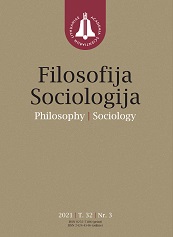COVID-19 situacijos, valdžios veiksmų vertinimo ir subjektyvios gerovės sąsajos Lietuvoje
Interrelation among COVID-19 Situation, Evaluation of Government Actions and Subjective Well-being in Lithuania
Author(s): Dainius Genys, Ričardas KrikštolaitisSubject(s): Governance, Welfare systems, Health and medicine and law, Sociology of Politics
Published by: Lietuvos mokslų akademijos leidykla
Keywords: COVID-19 assessment; government actions; subjective well-being; cluster analysis;
Summary/Abstract: The huge and sudden challenge of the COVID-19 pandemic created the need for quick governmental decisions, at the same time provoking changes in subjective public perception. The article empirically analyses the attitudes of different groups in Lithuania to-wards the COVID-19 situation, government actions and changes in subjective personal well-being. A representative public opinion poll (N-804) was conducted to achieve this goal. Empirical research sought to elucidate individual self-protection measures, attitudes towards the danger of the virus, government-implemented measures to combat the pandemic, and common stereotypes as well as consequences for subjective well-being. The cluster analysis confirmed the assumption that there is a link between the perception of the role of society and expectations towards the government, and between the dynamics of trust in key political actors and support for specific government actions in the context of a pandemic. If the group is more self-reliant, government policies that regulate even small aspects of public life lead to disagreement (in the case of 1st cluster), and vice versa, if the group has high expectations of government, it receives support (in the case of 3rd cluster).
Journal: Filosofija. Sociologija
- Issue Year: 32/2021
- Issue No: 4
- Page Range: 335-345
- Page Count: 11
- Language: Lithuanian

